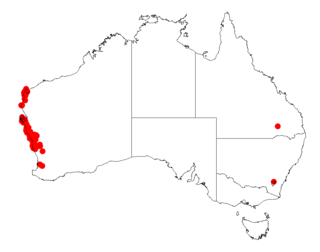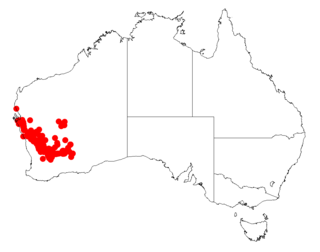
Acacia longifolia is a species of Acacia native to southeastern Australia, from the extreme southeast of Queensland, eastern New South Wales, eastern and southern Victoria, southeastern South Australia, and Tasmania. Common names for it include long-leaved wattle, acacia trinervis, aroma doble, golden wattle, coast wattle, sallow wattle and Sydney golden wattle. It is not listed as being a threatened species, and is considered invasive in Portugal, New Zealand and South Africa. In the southern region of Western Australia, it has become naturalised and has been classed as a weed due to its out-competing indigenous species. It is a tree that grows very quickly, reaching 7–10 m in five to six years.

Acacia glaucoptera, commonly known as flat wattle or clay wattle, is a species of Acacia which is endemic to the south-west of Western Australia.

Acacia verticillata is a perennial shrub to small tree native to south eastern Australia.

Acacia maitlandii, also known as Maitland's wattle, is a perennial tree native to Australia.

Acacia myrtifolia, known colloquially as myrtle wattle, red stem wattle or red-stemmed wattle, is a species of Acacia native to coastal areas of southern and eastern Australia.

Acacia hakeoides, known colloquially as hakea wattle, hakea-leaved wattle or western black wattle, is a species of flowering plant endemic to southern Australia. It is a bushy shrub or tree with lance-shaped to linear phyllodes, racemes of bright golden-yellow flowers and more or less leathery to leathery to hard and brittle pods. It can be found growing in sandy soils in semiarid and Eucalyptus woodland in the region.

Acacia cummingiana is a shrub belonging to the genus Acacia. It is native to a small area on the Swan coastal plain and the Geraldton sandplain in Western Australia.

Acacia oncinophylla, commonly known as hook-leaved acacia, is a shrub belonging to the genus Acacia and the subgenus Juliflorae.

Acacia ramulosa, commonly known as horse mulga or bowgada wattle, is a shrub belonging to the genus Acacia and the subgenus Juliflorae endemic to arid areas of Australia.

Acacia amblygona, commonly known as fan wattle or fan leaf wattle, is a species of flowering plant in the family Fabaceae and is endemic to continental Australia. It is a sprawling, sometimes prostrate shrub with sharply-pointed, lance-shaped, tapering phyllodes, golden-yellow flowers arranged in a spherical head of 10 to 18 in the axils of phyllodes, and curved, coiled or twisted pods up to 70 mm (2.8 in) long.

Acacia amblyophylla is a species of flowering plant in the family Fabaceae and is endemic to an area near Shark Bay in the north-west of Western Australia. It is a bushy shrub or tree with a dense crown, many suckers, lance-shaped phyllodes with the narrower end towards the base, golden-coloured flowers arranged in spherical heads each of 24 to 26, and broadly linear to narrowly oblong pods up to 200 mm (7.9 in) long.

Acacia gregorii, commonly known as Gregory's wattle, is a shrub belonging to the genus Acacia and the subgenus Phyllodineae native to Western Australia.

Acacia littorea, also known as the shark tooth wattle, is a shrub belonging to the genus Acacia and the subgenus Phyllodineae.

Acacia merrallii, commonly known as Merrall's wattle, is a shrub belonging to the genus Acacia and the subgenus Phyllodineae that is endemic to south western and southern Australia.

Acacia nervosa, commonly known as rib wattleribbed wattle or perfumed wattle, is a shrub belonging to the genus Acacia and the subgenus Phyllodineae.

Acacia spathulifolia commonly known as Gold carpet or the Gold carpet wattle is a shrub of the genus Acacia and the subgenus Phyllodineae that is endemic to coastal parts of western Australia.

Acacia urophylla, commonly known as pointed leaved acacia, tall-leaved acacia, veined wattle or net-leaved wattle, is a shrub of the genus Acacia and the subgenus Phyllodineae endemic to Western Australia.

Acacia cochlearis, commonly known as the rigid wattle, is a shrub of the genus Acacia and the subgenus Plurinerves. It is native to an area along the coast from the Goldfields-Esperance to the Mid West regions of Western Australia.

Acacia longispinea is a shrub or tree of the genus Acacia and the subgenus Plurinerves that is endemic to an area of south western Australia.

Acacia falciformis, also commonly known as broad-leaved hickory, hickory wattle, mountain hickory, large-leaf wattle, tanning wattle and black wattle, is a shrub belonging to the genus Acacia and the subgenus Phyllodineae that is endemic to eastern Australia





















